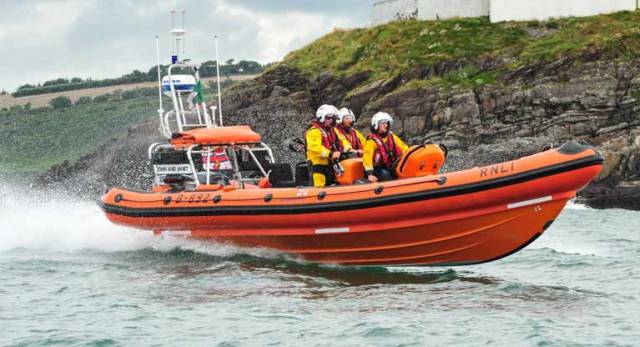As Christmas approaches, the RNLI is issuing its own call for help as new figures show that the charity’s volunteer lifeboat crews are more than 600% busier over the festive period compared with 40 years ago. The charity is facing a ‘Perfect Storm’ with more people than ever needing its help, meaning support from the public is more vital than ever.
During the festive period* last year, RNLI volunteers launched to the rescue 155 times compared with just 21 call outs in 1979. During the festive periods dating back to 1979, RNLI volunteers have rescued 1,453 people and saved 299 lives.
To ensure the RNLI can continue its lifesaving work this Christmas and into the future, the charity is running a major fundraising appeal, The Perfect Storm, with the aim of raising £1.8M and recruiting 12,000 new supporters.
While many people will be thinking about presents, turkey and time with the family, dedicated RNLI volunteers from 238 lifeboat stations across the UK and Ireland will be ensuring their yellow wellies and lifejackets are ready for when the call comes and will be ready to drop everything at a moment’s notice to save lives at sea.
In many cases, generations of the same family could be forced to abandon their turkey dinner and head to their local lifeboat station when the call for help comes in.
Long-serving RNLI volunteer Phil Eaglen joined Wells Lifeboat Station in 1967 and has dedicated an incredible 50 years of his life to saving others with the RNLI. This Christmas, joining him around the dinner table with their pagers close at hand will be his son and granddaughter, who like Phil, will be ready to respond if the call comes in.
Phil, who joined Wells RNLI as a shore crew volunteer at the age of 17, says:
‘Christmas is no different to any other time of year, we’ll still be on call ready to save lives and delay our own Christmas celebrations. We couldn’t do what we do without the support of the public. The RNLI has experienced a shortfall in funds, but we are rescuing more people than ever before. We are facing the Perfect Storm and are calling on people to make a donation this Christmas to ensure we can continue saving lives at sea.’
The causes of callouts over the festive period have changed over the years. In the early 80s the most common reason for callouts was to commercial fishing vessels and powered craft. One notable rescue arose on Boxing Day in 1985 when a 65ft trawler found itself in difficulty in storm force conditions which saw the Ramsgate lifeboat launch. The trawler had run aground and the lifeboat launched into horrendous weather conditions to attach a tow and saved those onboard. The bravery shown by the lifeboat crew resulted in the coxswain being awarded a silver gallantry medal.
Since 2000, many of those needing help are often just visiting the coast and not out on vessels or watercraft. As well as slips, trips and falls, tidal cut offs are also a contributing factor to RNLI call outs.
Some families will be cherishing Christmas together thanks to the RNLI. Ben and Natalia Taylor are heading to Hoylake to pay their respects to the crews of Hoylake and New Brighton after the lives of their twin daughters, Evie and Lola, 12, were dramatically saved earlier this year.
The family were holidaying in Kent when the twins, who were playing in the sea on an inflatable unicorn, were swept along by the wind and rapidly started heading out to sea.
Ben swam out to what he described were just ‘two dots’ in the distance heading further out to sea. Margate RNLI lifeboat was launched and Ramsgate RNLI lifeboat and RNLI lifeguards joined the search. They picked up frantic dad Ben and thankfully discovered the girls had clung to a buoy and were safe and well after being picked up by a pleasure boat.
Ben says: ‘I cannot put into words the terror we experienced that day, it really put into perspective how precious life and family is. We’re already planning our Christmas this year and that really is thanks to the RNLI acting so quickly. It was the advice given just a couple of days before on the beach which helped Lola and Evie about what to do if they got into trouble and helped to save their lives.
‘I can’t bear to think what kind of Christmas this year could have been for me and my family, but thankfully and luckily we’re still here and have lots of fantastic celebrations planned. I’m in total admiration of all the volunteers who came to help us that day.
‘To think they do this voluntarily is just incomprehensible. Please donate whatever you can to support the Perfect Storm appeal and help the RNLI crews to continue saving lives.’
The RNLI’s Perfect Storm appeal has been launched in response to some major challenges the charity is facing. In 2018, the RNLI’s financial resources dropped by £28.6M, while its crews are busier than ever.































































